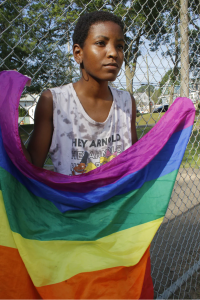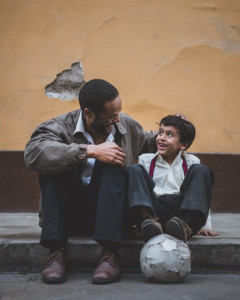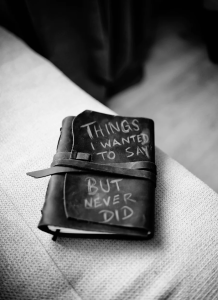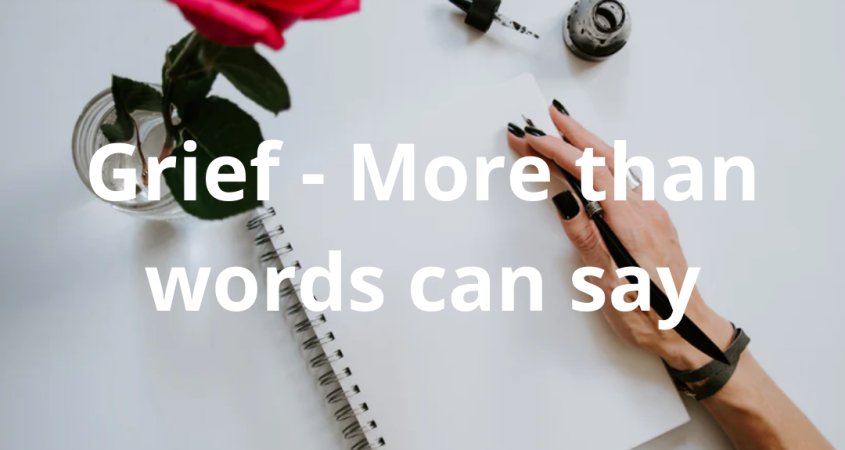Grief – More than Words can Say
The saying many of us learn in our school days – ‘sticks and stones can break my bones but names (words) can never hurt me’ – is not always our truth. Words can hurt, and, as another saying goes, can be more powerful than the sword.
The words that inform us of the death of someone we love, someone central to our identity and our way of being in the world, can hurt us to our core and render us speechless. It doesn’t seem to matter whether the death was sudden or expected, numbness seems to be a familiar initial reaction to what feels like the end of our world as we knew it.
The writer Isak Dinesen says “All sorrows can be borne if you put them in a story or tell a story about them.” There have been many times in my professional and personal life that I have found those words to be true, but I’m also aware that who we tell, when, where and how is equally important. An African proverb says ‘sorrow is like a precious treasure, shown only to friends’, and maybe to others who demonstrate the qualities we expect in friendship.
Some people may tell their story to a stranger on a bus stop more readily than they can to those closest to them because that stranger is not inhibited by fear. They may show genuine interest in the person seated beside them, and ask the questions others avoid for fear of stimulating tears. Their animated, natural responses are often more permissive than words that seem to come from a psychology textbook.
Germaine Greer’s quote – ‘Every time a man (person) unburdens himself to a stranger, he reaffirms the love that unites humanity’ – is worth considering at this point. The stranger might be someone at the bus stop, or a counsellor, but before we get to that special kind of communication, let’s think about communication in general.
I think we waste many opportunities for creating or sustaining connections that have depth, that warm our hearts and make us feel good to be alive. On the other hand, I think there’s a time and place for all kinds of communication. The kind of fairy floss conversation that creates a light hearted atmosphere at parties would be inappropriate at funerals, just as funereal conversations are usually inappropriate on festive occasions.
Wherever we are, and whoever we’re with, I think it’s important to think about the power of our words, and the characteristic way we communicate as individuals, and as part of a group.
Verbal Communication
 All living things communicate in some way – through words, pictures, movement, body language, touch, taste, smell and sound. Spoken words are particularly important to us humans, but not everyone can speak, and not everyone can hear or understand speech. Processing and hearing difficulties aside, few of us can understand the languages of other countries and cultures.
All living things communicate in some way – through words, pictures, movement, body language, touch, taste, smell and sound. Spoken words are particularly important to us humans, but not everyone can speak, and not everyone can hear or understand speech. Processing and hearing difficulties aside, few of us can understand the languages of other countries and cultures.
A Google search reveals that there are currently 7,139 spoken languages in our world, a number always in flux, with 23 languages accounting for more than half of the world’s population.
I’ve had a hearing problem since early childhood, exacerbated now by my senior citizen status and I have to confess that there are a few advantages involved in this disability, in amongst the many disadvantages.
Minus hearing aids, I’m undisturbed by the irritating sound of mosquitos buzzing, by the deafening noise created by early Sunday morning leaf blowing enthusiasts, or the noise of builders in our local area. But I do miss the delightful sound of rain on the roof, and occasionally the detail of heart warming compliments my husband gives me on a regular basis. Maybe I just like to hear him repeat them?
As a counsellor, words have always been particularly important to me. I want, and need, to hear people’s stories in order to really connect with them, to understand their relationships, their life experiences, and the context of their distress. Fortunately, one of the advantages of my hearing difficulties is that over the years I’ve learned to mentally insert missing pieces in a story from observing body language. Hearing aids have made the task more manageable and accurate.
In my private life, I am grateful when watching TV for the help of very effective earphones my husband presented me with a few years ago. If I watch a movie without those special aids I’m restricted to relying on my observations of body language to note who fancies who, who is angry, sad, scared, jealous or happy, and who seem to be the goodies or baddies.
As a former relationship therapist I can find family dynamics in a range of televised dramas fascinating when I experience them minus words. If I carefully observe family members first as individuals, then in relationship to others, I can usually pick up subtle cues that are ‘more than words can say.’ As the saying goes, ‘a picture is (sometimes) worth a thousand words’.
Non Verbal Communication
 We learn how to read body language from the moment our eyes focus in infancy.
We learn how to read body language from the moment our eyes focus in infancy.
Studies show that even small babies respond to beautiful faces – those that are blessed with pleasing symmetry. They also respond to smiles. Very young children discern from parental facial expressions and voice tones when they should run and hide, when they should be afraid, whether to laugh or cry, and whether they are loved.
As parents or caregivers of young children we learn to interpret wordless communication in order to keep our little ones safe, to make them feel secure, or to rescue them from boredom. We learn quickly how to differentiate one crying sound from another, to put words to facial expressions, and to understand behaviour in general as a child’s language. This is particularly relevant when we are trying to understand the internal world of sick, injured, bereaved, traumatised or grieving children.
Children often learn how to understand body language from owning, playing with, or observing animals. An animal lover, I have always enjoyed putting words to their behaviour, and, convinced as a five year old that a horse in a paddock at the end of our street was sad, insisted on taking a clean white handkerchief of my father’s to wipe its nose. Stray cats and dogs always looked sad to me, and to my sisters, and desperately in need of the good home we believed we could provide. Unfortunately, our rescue team of three usually arrived on the scene too late to save most of them, so we became death whisperers instead of the angels of mercy and recovery we fancied ourselves as.
Despite my lifelong interest in non-verbal communication, I am not a fan of most interpretive books on the subject. Many provide fairly black and white, analytical interpretations of the body language of others, and make inaccurate as well as accurate assumptions. When possible, I prefer to ask people what their body language means to them, even small children, or to tell them how their body language affects me.
These days, I think we need to be particularly cautious about the interpretive and judgemental information we receive from a wide variety of sources. Visual communication via print and electronic media can be edited to manipulate the narrative we receive, as can the images and sounds we receive via TV. For example, a journalist with a bias can choose to present images or words that confirm their interpretation or judgement of people and events.
A clear and distressing example of biased communication is the way Lindy Chamberlain was judged by the media and presented to the general public in a way that strongly affected public opinion. Photos of her body language, mostly devoid of overt emotion, were interpreted and presented by journalists as confirmation of guilt. Lindy’s truth is that photos of her tears and distress were never shown.
In any family, in any social group, there will be a range of ways individuals react to the environment, to events and to their personal circumstances. If we focus on body language alone, it will probably be easy to see that some folk are angry, scared, sad, happy, bored or frustrated. Others may be harder to ‘read’, their pain invisible to others, their joy, fear, anger and frustration controlled, hidden or masked by contradictory behaviour. Assumptions can be accurate, totally wrong, and at times, dangerous.
For most of us, body language reinforced with words tends to have the greatest impact and level of accuracy.
Receiving Words of Praise
 If we are fortunate, we grow up in families who reward our successes with praise that has been earned through effort. These early words of congratulation have the power to strengthen our desire to try harder to reach goals, and perhaps to please others. Hopefully, all of this happens in a very balanced way so that we don’t risk the derogatory label of being ‘people pleasers’, and aren’t left with the belief that we are only loveable when we are successful.
If we are fortunate, we grow up in families who reward our successes with praise that has been earned through effort. These early words of congratulation have the power to strengthen our desire to try harder to reach goals, and perhaps to please others. Hopefully, all of this happens in a very balanced way so that we don’t risk the derogatory label of being ‘people pleasers’, and aren’t left with the belief that we are only loveable when we are successful.
Praise given when we know we have earned it develops what I call our emotional ‘receptor sites’ so that we are able to receive genuine praise, with grace, for the rest of our lives.
Some children unfortunately are taught to distrust all praise. They may grow up in circumstances where the words ‘people only praise you when they want something’ become familiar background noise. Others may receive genuine praise only to have it removed with words like ‘don’t get too big for your boots’, or some form of mocking humour that suggests the praise must be meant for someone else.
If the ‘receptor site’ is seriously damaged, it may take some folk many sessions with a skilled therapist before genuine praise can be received and retained.
Unfortunately, some people do attempt to manipulate with praise and it’s the responsibility of all caring adults in a child’s life to help them discern the difference between what should be received with grace and what should be assertively, and perhaps silently, dismissed.
When we give truthful, genuine praise to someone and they reject it outright, or dismiss it with a counteracting statement, we may feel hurt. It can feel as if our intelligence or our ability to discern is being questioned. On the other hand, the ability to receive with grace, praise that is sincere, and given without ulterior motive, is an endearing quality.
Giving Words of Praise
 When we keep words of admiration of others to ourselves, we create unfinished business. If people have a positive impact on our lives, it’s important that we tell them, and tell them without expectation of a response.
When we keep words of admiration of others to ourselves, we create unfinished business. If people have a positive impact on our lives, it’s important that we tell them, and tell them without expectation of a response.
That’s harder than it sounds. Unconsciously, we may hope that the person we praise will like us more. To praise, when there is absolutely no ulterior motive, or to give genuine praise to someone we really don’t like, can take a bit of courage.
Think about it for a moment.
How often do we initiate compliments? Do we wait until someone compliments us before responding with a version of “I like yours too.”
Initiating compliments and words of praise can sometimes mean taking a risk. The person receiving our words may not like us at all, their facial expression letting us know that that any communication, including praise, is unwelcome from us. Compliments from a stranger may take us by surprise and leave us awkwardly struggling to find appropriate words of response. Sometimes all that is needed is a smile.
I am fortunate to have received compliments over the years from perfect strangers, usually women, and been touched by their spontaneity and courage.
Their simple words and smiling faces have changed the way I experienced the rest of the day, as have genuine compliments given in my place of work.
The right words, at the right time, can increase productivity, can warm hearts, increase confidence, and the ripple effect can be passed on in the way the receiver treats others.
Words of Criticism
 Bereaved people of all ages frequently tell counsellors at ‘A Friends’ Place’ of criticism they receive from relatives, friends, and colleagues. Criticisms expressed to children include everything from the way their grief is expressed (or not), to whether or not they should be having bereavement counselling. Adults receive much the same, with comments extending to the nature of their child rearing and housekeeping. Comments, felt like a body blow, are usually made at times when grief is raw and the grieving person is feeling vulnerable and defenceless.
Bereaved people of all ages frequently tell counsellors at ‘A Friends’ Place’ of criticism they receive from relatives, friends, and colleagues. Criticisms expressed to children include everything from the way their grief is expressed (or not), to whether or not they should be having bereavement counselling. Adults receive much the same, with comments extending to the nature of their child rearing and housekeeping. Comments, felt like a body blow, are usually made at times when grief is raw and the grieving person is feeling vulnerable and defenceless.
Receiving criticism is difficult for most of us at the best of times and tends to stimulate regression and defensiveness. If we’ve grown up in a family environment where criticism was a frequent experience, our defence ‘button’ is likely to be hypersensitive. However, sensitivity aside, we all occasionally need, and can benefit from, constructive criticism, given at the right time, by the right person.
How do we make criticism constructive rather than something that feels like an attack?
Instructions to counsellors in training frequently include the advice ‘criticism/confrontation should be an invitation to grow’, not a weapon of war. If we think about them, the words ‘an invitation to grow’ might give us an indication of the tone, volume and energy we need to use, and the facial expression that will enhance the receiver’s ability to receive our comments as being ‘them centred’.
There is an additional and vitally important aspect we need to add, and that is the context in which criticism is given, and the pre existing relationship between the giver and the receiver. If we know for sure that the ‘critic’ genuinely cares about us, that their comments are made with our best interests at heart, we may feel the sting for a moment or two, process what has been said, then decide how to make use of ‘the invitation’. I can’t truthfully claim to have always presented criticism in the smooth, other centred way I’m describing, but I hope I do so more often than not.
At ‘A Friends’ Place’ we call the first two years after bereavement a period of raw and intense grief. Into the third year, from a protective perspective, counsellors are likely to gently encourage bereaved clients to express intense grief in private. Tear filled eyes in public, tears running down our cheeks, are OK at any time that grief is brought back into foreground, something that may happen forever. But, as we learn how to live with the absence of those we love, we need to feel more in control of our grief rather than it controlling us. Anyone who cares for us will have the same hope on our behalf. Gentle tears give caring people a role – they can comfort or distract, relieved that they don’t feel helpless.
If our public expressions of grief are intense and loud after a ‘suitable’ lapse of time, carers and observers are likely to feel helpless, embarrassed or scared. If that’s the case, a trusted person, or caring stranger, might say “how about we go somewhere private and talk about what’s happening. Maybe I could get you a coffee?”
Alternatively, a comforting arm which gently steers the grieving person to a more private space, if accompanied by a facial expression that shows genuine concern, can be a gentle and appropriate invitation that is ‘more than words can say’.
Words of Love
 To be loved is important for most living creatures. To feel loved is dependent on many things – our early life experience, our mental and physical health, our physical and emotional environment, and current circumstances.
To be loved is important for most living creatures. To feel loved is dependent on many things – our early life experience, our mental and physical health, our physical and emotional environment, and current circumstances.
All children deserve to feel loved from the moment they are born, but unfortunately, that isn’t the life experience of more children than we might dare to think about for long.
For many, hearing the words ‘I love you’ is a familiar bonus of growing up in an expressive family. For others, in families who weren’t verbally expressive, actions have had to speak louder than words. As adults, children raised in either kind of family tend to respond to the question “did you feel loved when you were growing up ” with a very firm “yes”.
Children who grow up in loveless homes tend to become adults who find giving and receiving love difficult, or alternatively, with a craving for love that makes them vulnerable to use or abuse. Chronic grief and a feeling of emptiness or unworthiness is their everyday experience.
Grief, whether the kind of chronic grief experienced in loveless family situations, or the raw grief of bereavement, can make people afraid of attachment. After all, grief is the price we pay for love. Defending ourselves against attachment might keep us safe, make us feel more in control, but without love, safety can be a cold and lonely place to be. Many years ago, following a period of intense grief, I wrote the words “To love is to risk pain. Yet, knowing this, I’d love again.”
Most people want to be loved, and feel heart-warmed by the experience. Yet strangely, the ability to love, and to experience the joy of giving love to another can feel even better – as if our heart is expanding.
Words of Grief
 Grief is more than words can say.
Grief is more than words can say.
Initially, if there are any, they are usually expletives, rarely more than two words at a time. Body language, internal and external, says it all.
Shock usually stimulates a fight, flight or freeze response which will be determined by the nature of the death, the circumstances in which we learn of the event, and our personality.
Later, spoken words for some will prove invaluable. For others, their bodies and their actions will continue to speak on their behalf.
Words of Condolence
 As I write those words, two images immediately spring to mind. The first, a movie type caricature of a funeral director’s introductory words ‘my sincere condolences’. The second is an image of people crossing the street so they don’t have to face a neighbour or acquaintance who is newly bereaved. Their words of explanation or excuse when questioned are usually along the lines of ‘but I don’t know what to say’.
As I write those words, two images immediately spring to mind. The first, a movie type caricature of a funeral director’s introductory words ‘my sincere condolences’. The second is an image of people crossing the street so they don’t have to face a neighbour or acquaintance who is newly bereaved. Their words of explanation or excuse when questioned are usually along the lines of ‘but I don’t know what to say’.
Of course it’s hard struggling to find the right words, if they really exist, but if it was easy we’d need to examine our sensitivity and ability to be empathic. What bereaved people need is our truth, our feelings of helplessness and concern, not polished, empty words.
Our truth is often along the lines of “I wish I could say or do something to make you feel better. I know I can’t but I want you to know that I care.” At another time we might say “I feel so helpless. I know I can’t change anything, but would it help if I …?” Or perhaps “what’s the most helpful thing I could do at the moment – stay away for a while, or keep you company?”
One of the fears many people have is of making the bereaved person cry. For most bereaved folk, tears (just waiting to be shed in the right environment) don’t hurt, but being avoided does.
In some of my other writing I suggest that the right question at the right time by the right person can be sensitive and therapeutic. Weeks, months, years later, ask about the person who died, and use their name. Ask questions about their life, not about the way they died.
A quote I love from the beautiful book ‘The Dictionary of Lost Words’ by Pip Williams, is ‘words are our tools of resurrection’. Each time we talk about the person we love, we bring them back into life, back into our life. Genuine, interested questions can provide invaluable opportunities for ‘resurrection’, and help the bereaved person feel confident that the person they love will live in their heart and mind forever, and in the hearts and minds of others.
Struggling to find the right words to express our truth is more important than the words themselves – the depth of our concern should always be ‘more than words can say’. I’ll illustrate what I’m saying by sharing a poem I wrote many years ago about my own grief, and the grief of people I counselled.
STILL LIFE
I look upon the face of death and see ‘still life’
No movement here,
No sound, no light;
No clichéd words, passionless and trite
Can touch the wellspring of my pain,
The darkness of my night.
Give me your hand,
Your anguished eyes,
Your awkward words of helplessness;
Acknowledge my despair.
To feel you there is all I need
To know there is still life.
Help
Help is always available – at ‘A Friend’s Place’ or by contacting our outreach service.
Dianne McKissock OAM
NCCG Outreach Support Service
Email support for dying and bereaved people and anyone involved in their care






